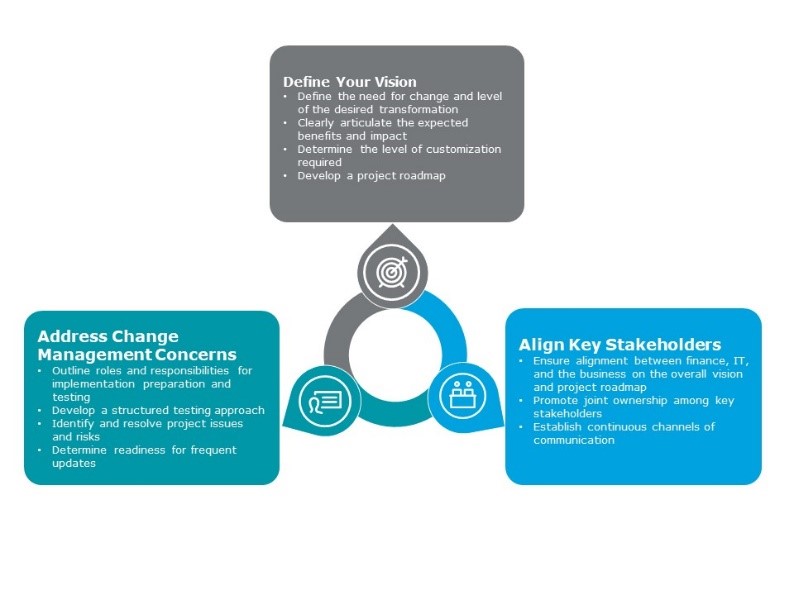
Getty Images/iStockphoto
How the Cloud Technologies Benefit Enterprise Resource Planning
Cloud technologies are a catalyst for change in digital finance with the potential to disrupt the entire healthcare landscape, especially enterprise resource planning.
The healthcare industry is on the cusp of a digital transformation that will affect stakeholders, customers, and organizations as a whole. At the center of this digital transformation is unlimited data, and organizations that build a new data model around aggregating, storing, and securing individual, population, institutional, and environmental data will likely be better positioned to drive the future of health.
One of the main emerging technologies disrupting transformation and benefiting organizations is enterprise resource planning (ERP) cloud computing software. ERP can transform companies’ IT architecture and infrastructure by using scalable, elastic technology to deliver services via the internet rather than traditional on-premise architectures. Fueled in part by its flexibility to meet a wide range of diverse needs, cloud ERP systems are seeing immense growth in the marketplace with the potential to disrupt the healthcare industry.
Aside from providing a made-to-order flexible solution, cloud ERP allows organizations to leverage powerful ERP technologies without substantial startup costs. At the same time, they can enable organizations to see benefits like streamlined data integration, improved accuracy and efficiency of data and research, enhanced patient experiences, and increased shareholder return.
Even with a clear idea of the potential benefits, controllers in the healthcare industry may find themselves with more questions than answers as they discuss and plan for cloud ERP implementation.
“Interoperability between cloud solutions and some of the EMR, health records, and even third parties are driving a lot of healthcare organizations’ to move into the Cloud.” – Tom Foley, principal, Deloitte Consulting LLP
Benefits of cloud ERP solutions for healthcare organizations
As a core technology, the cloud offers the potential for optimized data architectures and processing engines, flexibility and an opportunity to scale, and streamlined integration with other emerging technologies. Implementing cloud technology into healthcare organizations offers many specific benefits, including:
- Serves as a single platform and user interface to access and analyze infinite data across the organization, enhance research, and help innovators develop new tools and better solutions for consumer-centric and virtual health.
- Allows for a single source of the truth that is less reliant on data from multiple systems to enhance patient experience with more targeted solutions and generate unique insights for personalized, always-on decision-making and more reliable and efficient patient care.
- Offers streamlined ways to integrate with point solutions and other disruptive technologies that may reduce clinical platform costs, increase productivity and efficiency, and improve cost control across an entire organization.
The core components of cloud technologies provide organizations with a standardized platform to enable more streamlined and efficient processes. In turn, healthcare and health science organizations may be able to shorten close cycles and provide advanced insight into the business, while at the same time building more confidence in the accuracy of their data.
“Implementing a cloud ERP solution is a catalyst for transformation. It doesn’t just enable the overall controllership function, but also the other adjacent areas within your organizations, which can lead to a broader, more successful, and more refined operations in healthcare.” – Temano Shurland, Life sciences & health care principal Deloitte & Touche LLP

Leading practices for cloud ERP implementation
An organization’s journey into a cloud environment likely starts with a series of fundamental questions to validate the path forward. Should our organization migrate to the cloud? What cloud features do we want to adopt? How will migrating to the cloud impact the organization?
Nearly all of my clients are discussing what it means to move to the cloud. They are trying to get smarter—more educated—and they are reaching out to both technology vendors and organizations like Deloitte to get insights and information. —Tom Foley, principal, Deloitte Consulting LLP
While the drivers and roadmap for cloud implementation are unique for each organization, exploring its core features and potential for the future of healthcare can help professionals develop a broad understanding of cloud technology and what it can do for the future of healthcare.
___________________________________________________________________________
This article contains general information only and Deloitte is not, by means of this article, rendering accounting, business, financial, investment, legal, tax, or other professional advice or services. This article is not a substitute for such professional advice or services, nor should it be used as a basis for any decision or action that may affect your business. Before making any decision or taking any action that may affect your business, you should consult a qualified professional advisor. Deloitte shall not be responsible for any loss sustained by any person who relies on this article.About Deloitte
Deloitte refers to one or more of Deloitte Touche Tohmatsu Limited, a UK private company limited by guarantee (“DTTL”), its network of member firms, and their related entities. DTTL and each of its member firms are legally separate and independent entities. DTTL (also referred to as “Deloitte Global”) does not provide services to clients. In the United States, Deloitte refers to one or more of the US member firms of DTTL, their related entities that operate using the “Deloitte” name in the United States and their respective affiliates. Certain services may not be available to attest clients under the rules and regulations of public accounting. Please see www.deloitte.com/about to learn more about our global network of member firms.
Copyright © 2019 Deloitte Development LLC. All rights reserved.







